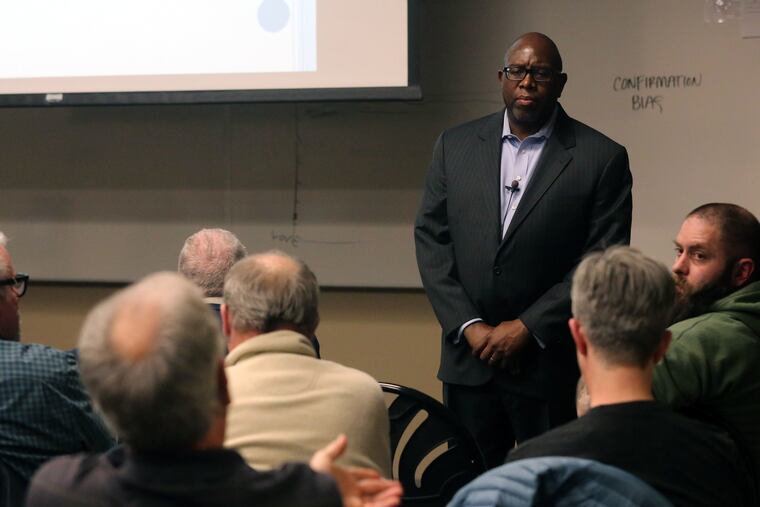Journalist visits Wyoming to explore why so many believe Trump’s ‘fake news’ claims - and teach how media work | Jenice Armstrong
I get a surprising number of angry emails from readers accusing me of being biased for sharing an opinion. I find myself explaining once again that columnists write from our personal viewpoints.

President Donald Trump’s complaints about so-called fake news have become so much a part of our lexicon that Walmart is selling fake news Halloween costumes.
Picture newsprint fabric emblazoned with the words in bright red lettering on a skimpy mini dress. A product description reads, “Spread all the alternative facts in this exclusive Fake News costume.…”
But there’s nothing funny about the president’s deliberate attempts to manipulate the public and engender mistrust of the media. Democracy doesn’t work without journalists insisting on the public’s right to know and keeping us informed.
» READ MORE: Getting rid of Trump won’t end the war against press freedom in America | Will Bunch
That’s partly why Rod Hicks, the journalist on call for the Society of Professional Journalists, left his home in Sicklerville earlier this year to make six trips to Casper, Wyo. His goal was to hold a series of sessions with local residents to discover why they don’t trust the press and what can be done about it.
He picked Casper because Wyoming scored low in a Gallup/Knight Foundation study about media trust. Casper’s population is just under 59,000. It’s in a red state that voted for Trump.
Hicks, a former editor for the Camden Courier-Post and the Associated Press in Philadelphia, among other outlets, wanted 100 participants but got just 36. (One dropped out.) Members of the Casper Project met every six weeks and discussed topics such as media distrust and bias.
» READ MORE: How the first U.S. city with no daily newspaper will help Trump in 2020 | Will Bunch
“A lot of times, when people complain about the news, they’re not really complaining about news. They’re complaining about commentary or propaganda or advertising or satire,” Hicks, 57, told me Tuesday. “It’s particularly acute online. You get something that says something outrageous, and you look at where it’s from and it’s from a website that you have never heard of.”
One session dealt with bias, during which participants complained about anonymous sources and coverage of the Trump administration. They were asked to bring in stories or videos they thought were unfair.
“About five people did that. But all five turned in stuff that was labeled editorial, commentary or opinion,” Hicks said. “Commentary, if it is properly labeled, that’s not bias.”
Participants also visited local newsrooms and met with national reporters. In the end, not a lot changed. Nobody who reported watching Fox News changed their viewing habits. And none of the MSNBC viewers switched, either. But that wasn’t the goal anyway.
Hicks’ hope was that “people would become more discerning in their approach to the news that they were receiving. Maybe they would change their news sources to something they thought was more reliable. They would better know how to judge whether something was really biased. And they would better understand external factors that influence what you read, such as small staffs.… All of that makes a difference.”
I wish Hicks had stayed closer to home instead of going all the way to Casper. We could use his expertise here. This may not be Trump country, but there’s still a lot of distrust of the media and confusion about the news business.
I’m frequently appalled by how many Facebook friends put as much stock in what they read in the New York Times as they do in a no-name gossip site.
» READ MORE: Fox News, CNN criticized for ‘shameful’ coverage of Trump national security official Alexander Vindman
I also get a surprising number of emails from readers accusing me of bias for sharing an opinion. I find myself explaining over and over that columnists write from our personal viewpoints. Our commentary is backed up by facts and reporting, but it still is our perspective.
The media are partly to blame. We need to do a better job of helping readers understand the business. I have invited Hicks to visit the Inquirer newsroom. Maybe one day, he’ll launch a Philadelphia Project to help local news consumers, too.
If people better understood how newsrooms operate, they would recognize that Trump’s favorite moniker for the media is just that — fake.